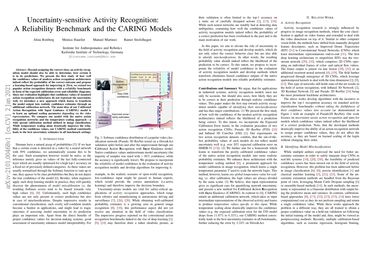Uncertainty-sensitive Activity Recognition: a Reliability Benchmark and the CARING Models
Beyond assigning the correct class, an activity recognition model should also be able to determine, how certain it is in its predictions. We present the first study of how welthe confidence values of modern action recognition architectures indeed reflect the probability of the correct outcome and propose a learning-based approach for improving it. First, we extend two popular action recognition datasets with a reliability benchmark in form of the expected calibration error and reliability diagrams. Since our evaluation highlights that confidence values of standard action recognition architectures do not represent the uncertainty well, we introduce a new approach which learns to transform the model output into realistic confidence estimates through an additional calibration network. The main idea of our Calibrated Action Recognition with Input Guidance (CARING) model is to learn an optimal scaling parameter depending on the video representation. We compare our model with the native action recognition networks and the temperature scaling approach - a wide spread calibration method utilized in image classification. While temperature scaling alone drastically improves the reliability of the confidence values, our CARING method consistently leads to the best uncertainty estimates in all benchmark settings.
PDF Abstract


